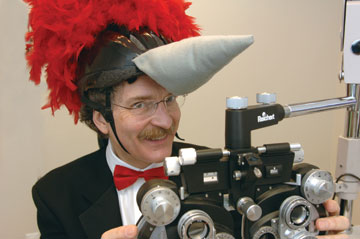Volume 24 · Number 2 · Winter 2007

(Emi Manning/UC Davis)
End Notes
Ig Nobel and proud of it
Ophthalmology professor Ivan Schwab got such a kick out of earning an Ig Nobel Prize that he dressed special for the ceremony. Schwab, selected for his study on why woodpeckers don’t get headaches, wore a woodpecker headdress.
The Ig Nobels are bestowed each year by Annals of Improbable Research magazine for 10 achievements that “first make people laugh and then make them think.” The prize that Schwab shared with the late UCLA psychiatry professor Phillip R.A. May was the first to be awarded in ornithology.
The awards were presented at Harvard University by real Nobel laureates.
Schwab specializes in disorders of the cornea but also has an interest in comparative ophthalmology, looking at how other animals process images. His article “Cure for a Headache,” based on May’s woodpecker research, appeared in the British Journal of Ophthalmology in 2002.
In addition to looking at why woodpeckers don’t get headaches, May and Schwab also identified how the birds’ unique skulls and jaws protect them from retinal detachments, brain damage and spinal cord injuries.
In his study, Schwab noted that North America’s largest woodpecker strikes a tree up to 10 times a second, as many as 12,000 times a day, with forces as high as 1,200 g’s with each impact. “That is equivalent to striking a wall at 16 miles an hour—face first—each time,” Schwab wrote.
Theft of note
You could call it a crime on a major scale. Three men carted off an old piano that has long been a fixture at the Memorial Union Coffee House. The piano is an upright, but the piano movers apparently were not. They were arrested the next day on burglary and grand theft charges.
At least two of the men had been on campus selling posters outside the MU. They pushed the wheeled piano out the door in full view of Coffee House employees and customers. “They are musicians and needed a piano,” campus police Lt. Nader Oweis told the California Aggie.
The piano was recovered from a Sacramento home and returned to its old spot next to the Coho espresso bar.
Fear benefactor
They don’t give autographs, but a number of Madagascar hissing cockroaches that live at the Bohart Museum of Entomology are retired television stars. They were donated to the museum after they were used in one of the outrageous stunts on Fear Factor.
The insects are among the world’s largest roaches, measuring two to three inches long and an inch wide—about the size of a small mouse. The Madagascan roaches hiss when disrupted or threatened by forcing air through a pair of modified abdominal spiracles, or pores, which are part of their respiratory system. Male roaches also hiss during courtship and mating.
The Bohart has maintained a collection of the insects for about 30 years. The roaches were stars with the museum’s youngest visitors long before Fear Factor. “The kids like to hold them and listen to them hiss,” said Lynn Kimsey, entomology professor and museum director.
Good enough to eat
The next time you’re in front of the Plant and Environmental
Sciences Building, try tasting the landscaping.
The campus grounds division is tending a half-dozen planting beds there filled with edibles: tomatoes, bell peppers and sage in the summer and Swiss chard, bull’s blood beets and early Stockton red onions in winter. The garden also features four citrus trees: lemons, oranges and blood oranges.
The garden is one reason that the Buildings and Grounds Division recently won a national award from the Professional Grounds Management Society. The Grand Award recognizes UC Davis’ innovative approaches.
“The idea is, people can come along and pick something to eat—and they do it all the time,” said Cary Avery, one of two grounds superintendents.
Sal Genito, director of the Buildings and Grounds Division, said his plan is to develop more thematic gardens, edible and nonedible, like the Garden of Ladyes at Voorhies Hall, which houses the Department of English. The “ladyes” are English roses named after characters in English literature, such as Jane Austen, Wise Portia and Sweet Juliet.
“At a university, we can all be students, learning as we walk from place to place,” he added.
In fact, an online tour of the Garden of Ladyes at grounds.ucdavis.edu/rosegarden includes a quiz.
